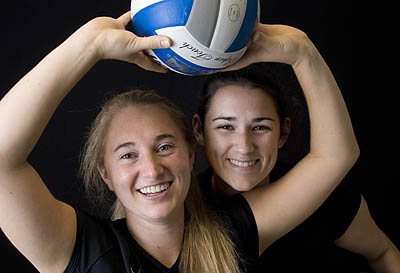Sports Notes
At the end of every point, volleyball co-captains Brittany Clement ’08 and Jenn Linton ’08 huddle with their teammates. “We wipe the slate clean, forget about the last point, and just get ready — mentally ready — for the next ball that’s coming,” says Linton, of West Redding, Conn.

Varsity team captains, including volleyball's Brittany Clement '08 (left) of Gobles, Mich., and Jenn Linton '08 of West Redding, Conn., set the tempo for their teammates.
Each huddle features a different cheer. After a block, they wave their hands in front of their faces and utter a ghostly “Wooooo!” An ace prompts a quick dance move accompanied by the immortal words, “Volleyball! What what!” After kills, the players surround the successful attacker and let her energy dictate the rest.
Silly, perhaps, but it’s sound strategy in a sport where momentum rules, points come in bunches, and a single mental error can replicate wildly into a team-wide epidemic.
“We come together and make eye contact,” Linton says. “If you make a mistake, you can’t hang your head. In volleyball, you always have to be looking up and paying attention. You have to be involved in the team.”
If Linton sounds like a coach, it’s because Bates team captains can and do influence team destiny in ways their head coaches sometimes can’t.
“Students at NESCAC schools run the varsity programs for most of the year,” says head men’s lacrosse and golf coach Peter Lasagna. It’s a matter of necessity in the NESCAC, which puts tight restrictions on when teams can begin practicing. For example, this winter’s teams began official practices on Nov. 1, just two weeks before the first contest of the season. Given the short official season, an organized off-season program is key. “Recruiting team leaders is the most important thing coaches do,” Lasagna adds. “Coaches often say to kids, ’This is your program.’ Our captains organize their peers, coach, sanction, and teach.”
- In Bobcat news, Bates will host two NCAA championship tournaments in the next year.
Of the 16 Bates head coaches, eight were captains in college, including field hockey head coach Wynn Hohlt, who captained the Williams field hockey and lacrosse teams. Hohlt encourages her captains to see the team’s big picture. “We sit down at the end of tryouts, and I ask for their feedback,” she says. Their being involved in determining the team’s makeup “is an important part of learning about team dynamics.”
Nordic coach Becky Flynn Woods ’89 was a college team captain in a sport where athletes often train and compete out of their coach’s sight. So it’s up to the captain “to work hard and get it done, day in and day out,” Woods says. “That sends a powerful message to the team.”
A sport’s customs and characteristics determine captains’ responsibilities. In rowing, captains bear an acute responsibility for care of pricey equipment. In track and field, an individual sport with disparate events, the captains on the women’s side focus on team cohesion. One tradition is creating T-shirts with unique messages or decorating teammates’ lockers before every race.
Performing duties for teammates and coaches alike, captains discover that anything team-related can demand their attention. “I don’t think I realized how pervasive this role was,” says Linton, and Clement agrees: “There’s a lot more responsibility than I was planning on.” Captains must keep tabs on and foster team morale, because head coaches know that any personal issues typically go to captains first. “Most players are more comfortable talking to the captains about their concerns than to me,” notes head women’s basketball and women’s soccer coach Jim Murphy ’69.
Captains organize visits by high school recruits and they pass down team culture and school knowledge, not a small matter on young teams like volleyball, where nine of 12 members are first-years or sophomores. Captains make sure equipment gets to the field (or onto the bus) and run warm-ups during practice and on game day.
Captains also organize fundraising for team purchases and training trips. “If the team wants to get jackets, pants, or in the case of this year, rugby shirts, they are responsible for finding the product, getting me all pertinent information — style, colors, sizes — and raising the money,” says Hohlt. Rowing co-captain Caitlin Murphy ’09 of Duxbury, Mass., spent part of her fall organizing her teammates into work parties, at $12 per hour, doing home chores to raise funds for the team’s spring training trip to Florida.
But amid the minutiae — and occasional frustrations, Clement admits — there are moments of pure leadership.
Last January, squash co-captain Sean Wilkinson ’08 of London, England, and his fellow Bobcats were playing Navy, their intense rival, at Yale. Wilkinson was officiating a match between fellow co-captain Ricky Weisskopf ’08 and Tucker George, the No. 1 Midshipman whose proclaimed goal each year is to defeat Weisskopf.
During the match, Weisskopf suffered a knee cut. Squash rules are clear: A player has two minutes to have a blood injury cleaned and bandaged, and if it happens a second time the match is forfeited. Problem was, the Yale trainer’s room was four floors and several minutes away.
The sportsmanlike solution, said Wilkinson, was to give Weisskopf time to get to a trainer. But in increasingly heated tones, the Navy player and two Navy coaches insisted that Weisskopf should forfeit the match. With Bobcat head coach John Illig down in the trainer’s room with another player, Bates’ junior captain took the Navy’s broadside but held his ground. “It’s all about standing up for Bates squash and for our reputation for sportsmanship,” Wilkinson says. “It’s what I learned from my captains, Alex Wolff ’05 and Rob Weller ’05.”
Wilkinson’s ruling prevailed, and Weisskopf was allowed to get his cut bandaged. No longer bloody and definitely not bowed, he sailed through his match with Tucker George, giving Bates a 5-4 team victory over the Midshipmen.
And that’s certainly worth a big “Wooooo!” from the volleyball captains.